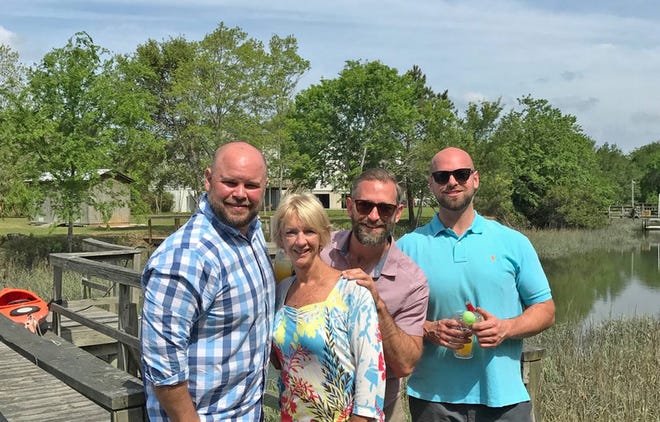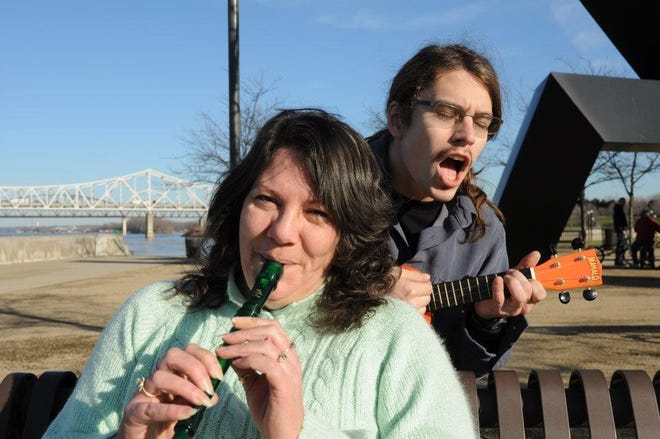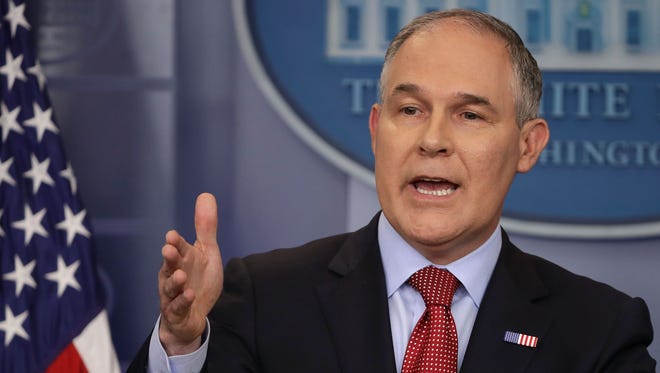A chemical paint stripper killed their kids. Inside their heroic fight to have it banned.
This story was published in partnership with theCenter for Public Integrity, a nonprofit newsroom that investigates inequality.
A bathtub. A floor. A bike. The items Kevin Hartley, Drew Wynne and Joshua Atkins had been working on at the time of their deaths less than 10 months apart varied, but what cut their lives short was the same: a chemical in paint strippers and other products sold in stores nationwide.
In their grief and horror, their families vowed to fight like heck to keep methylene chloride from killing again.
Get it off the shelves. Ban it.

But in the U.S., with its checkered history of weak worker and consumer protections, astonishingly few chemicals have ever met that fate. That’s how methylene chloride became a serial killer despite warnings of its fumes’ dangers before Hartley, Wynne and Atkins had even been born. No agency intervened as it struck down dozens of people — if not more — in recent decades.
After a Center for Public Integrity investigation and pleas from safety advocates, the U.S. Environmental Protection Agency finally proposed to largely ban it in
The three men’s mothers and other relatives had a seemingly impossible task ahead of them.
And yet, 13 months after Atkins’ death, the under-pressure Trump EPA acted to stop retail sales of paint strippers with methylene chloride. And in April, the Biden EPA proposed a rule to ban the chemical in all consumer products and most workplace uses.
“It’s rare that we do this in America,” said Dr. Robert Harrison, a clinical professor of occupational and environmental medicine at the University of California, San Francisco. “These families are my heroes.”
Here’s how they beat the odds to get those results — and the advice they give if you’re starting down a similarly hard road, whether the situation involves a dangerous product, an unsafe work environment, pollution, or other harm.
Start with research

“Google everything,” said Brian Wynne, whose brother Drew, 31, had purchased a methylene chloride product to refinish the floor of a walk-in refrigerator in his South Carolina cold brew coffee business. “And reach out to people.”
That’s how he found the Public Integrity investigation published two years before his brother’s death, connected with experts and learned everything from the places you could purchase the products to the reasons these fatalities are hard to track. (Methylene chloride kills when its fumes build up in enclosed spaces, and its ability to trigger a heart attack can look like death from natural causes if no one orders a toxicology test.)
A tip from Wendy Hartley, Kevin’s mother: “scholarly” is a super keyword in searches. There could be a whole universe of studies out there, just waiting for you. “This will help weed out the opinion pieces from the facts,” she wrote in an email.
Lauren Atkins, mother of Joshua, 31, who died refinishing the front fork of his BMX bike, talked to UCSF’s Harrison on multiple occasions. She found her son slumped over dead, a one-quart can of paint stripper nearby in February 2018.
Harrison’s understanding of methylene chloride helped her translate her son’s toxicology and autopsy reports into a clear cause of death. That clarity was a solid foundation for action.
Often, chemical exposure hurts people on a delay, triggering health impacts that might not show up for years. Pollution can be a similar story. But if you’re trying to get government action on harms of that sort, academic studies are still a great place to begin.
Team up with everyone you can

A key source of their success is that the families connected with groups already working on chemical safety, and with each other.
Lauren Atkins, for instance, found a Change.org petition about methylene chloride products from the advocacy group Safer Chemicals Healthy Families, now part of Toxic-Free Future, and signed it in honor of the son she’d so recently lost. Brian Wynne quickly reached out.
Teaming up leveraged their strengths. The families didn’t have to start from scratch to press retailers to pull the products from their shelves in the absence of EPA action: Safer Chemicals Healthy Families already had a Mind the Store campaign for exactly that type of appeal.
And they didn’t have to figure out the inner workings of agency rulemaking or Capitol Hill lobbying on their own. Staff with Safer Chemicals Healthy Families and the Environmental Defense Fund had that expertise.
More:A 'lifetime of burden': Older Black adults die from air pollution three times the rate of white adults, study finds
Finding the language on climate changeHeather McTeer Toney fights for environmental justice in the South
They opened up doors “that I would not have known how to open,” Lauren Atkins said.
“When you can put together a squad like that … you’ve got something really powerful,” said Brian Wynne, pointing to the Natural Resources Defense Council as another active group on the issue.
Not everyone with a stake in the fight will be able to take a public role in it. Immigrants without permanent legal status face higher risks of workplace hazards, for instance, and that lack of status can make it hard or impossible to speak out.
But if you’re in that situation, you might still be able to connect and help in private.
Work the system(s)
Had the families focused all their attention on the EPA, the agency paradoxically might not have acted — especially during the rule-averse Trump administration.
Instead, they and the groups they’d joined forces with fought on multiple fronts.

With Mind the Store, they pressed retailers to save lives by not selling paint strippers that contained methylene chloride. Petitions and protests worked. One by one, companies ranging from The Home Depot to Walmart agreed to stop.
With Safer Chemicals Healthy Families and the Environmental Defense Fund, they pressed members of Congress to take action. They traveled to Washington, family photos in hand. They talked to reporters, getting news coverage that further turned up the heat.
South Carolina’s senators and one of its congressmen wrote to Scott Pruitt, then administrator of the EPA. Another congressman called Pruitt out on the issue in an April 2018 hearing. Brian Wynne thinks all of that helped the families schedule a meeting with Pruitt in May 2018.
“The security guard was shocked because nobody got in to meet him,” Brian Wynne said. “It was a lot like meeting with the great and powerful Oz.”

Two days later, the EPA announced it would, in fact, do something about methylene chloride.
Along the way, the families turned to courts for action. They used social media to warn people not to put themselves at risk. And Lauren Atkins traveled to hardware stores to see for herself whether they’d actually pulled the methylene chloride items from shelves as they said they would. (Sometimes yes. Sometimes no.)
If all that seems exhausting, you’re not wrong. But the families think it’s clear what would have happened, had they not stepped in.
“Nothing would have been done,” Lauren Atkins said, “just like it hadn’t been done before.”
Remember it’s a marathon, not a race
“Don’t get frustrated with the small results,” Brian Wynne advised. “Be encouraged.”
Small wins multiplied. One thing led to another because the families didn’t give up. Settling in for the long haul is often necessary: Federal rulemaking is slow by design.
An agency might need several years — or many more — to complete the research required to propose a rule. The proposal must jump hurdles to get finalized. And even then, any restrictions or new requirements might phase in over time.
What allowed the families to win a partial ban from the EPA so quickly, relatively speaking, is that the agency already had issued a proposal before effectively shelving it. But it still took two-and-a-half years after Kevin Hartley’s death before the EPA restrictions went into effect. And they didn’t cover workplace uses — such as the bathtub refinishing that Kevin, 21, had been doing on the job.
Still, an agency can make different decisions with different people in charge. The EPA’s latest proposal, targeted for enactment in August 2024, would ban workplace use of methylene chloride in most cases. Bathtub refinishing included.
“You have to have patience, you have to have persistence,” Lauren Atkins said. “When it comes to somebody’s life, especially when it’s your child, you’ll find it. It’ll be right there.”
Mind your mental health
Pushing for change is hard. Pushing for change because you or a loved one was harmed can be even harder — even as it might offer a solace nothing else can bring.
“Buckle up, because it’s going to be an emotional train wreck,” Lauren Atkins warned. “I kept being asked, as emotional as this was and as hard as it was, why do I keep doing this? And my answer has always been and always will be, ‘So that you don’t have to sit in my seat. So that you don’t have to be where I am.’”
That mission gave her purpose amid the fog of grief.
“How do you function when you’ve just lost half of yourself? At times, I felt the same day his heart stopped beating, so did mine,” she said. “But because I didn’t want anyone else to go through this and I didn’t want anyone else to lose what Joshua lost, that was my goal. I was willing to do whatever it took.”
Brian Wynne, similarly driven, suggests leaning into a stress-relieving activity that helps ground you through the marathon. The gym was his. “You’ve got to find your outlet to have an emotional release,” he said.
The Wynne family also started a foundation in Drew’s name to fund entrepreneurs like him.
OpinionA toxic chemical killed my son — but we could have prevented it

Wendy Hartley found the activism itself healing — because of the support from the other families and the results they achieved together.
As an organ donor, her son had an immediate effect on other people’s lives. Seeing his impact ripple further, through retailer shelves and the halls of government, was a comfort.
“Kevin has now saved more lives,” she wrote, “and will continue to save lives for years to come.”
Never forget that your story is powerful
If you're pushing for change, it can be easy to assume that lobbyists paid to maintain the status quo will always win out. But your life experience has heft that cannot be bought.
“If you know how to present your story, which is part of your life, so you can do it — when you can present that story, good luck, lobbyists,” Brian Wynne said. “We’re coming with passion and love, and it’s hard to beat that.”
Wendy Hartley’s advice: “Don't be afraid to show emotion.” Talk about the effect on you and your family. “Show them the personal impact with pictures.”
“Six years ago, if somebody would have said, ‘If you scream loud enough, the government will listen,’ I would have laughed,” Lauren Atkins said. “Guess what? A voice can make a difference. I consider this part of my son’s legacy.”
So don’t count yourself out.
“Your impact,” Wendy Hartley wrote, “may be larger than you think.” Jamie Smith Hopkins is a reporter for theCenter for Public Integrity, a nonprofit newsroom that investigates inequality
No comments: